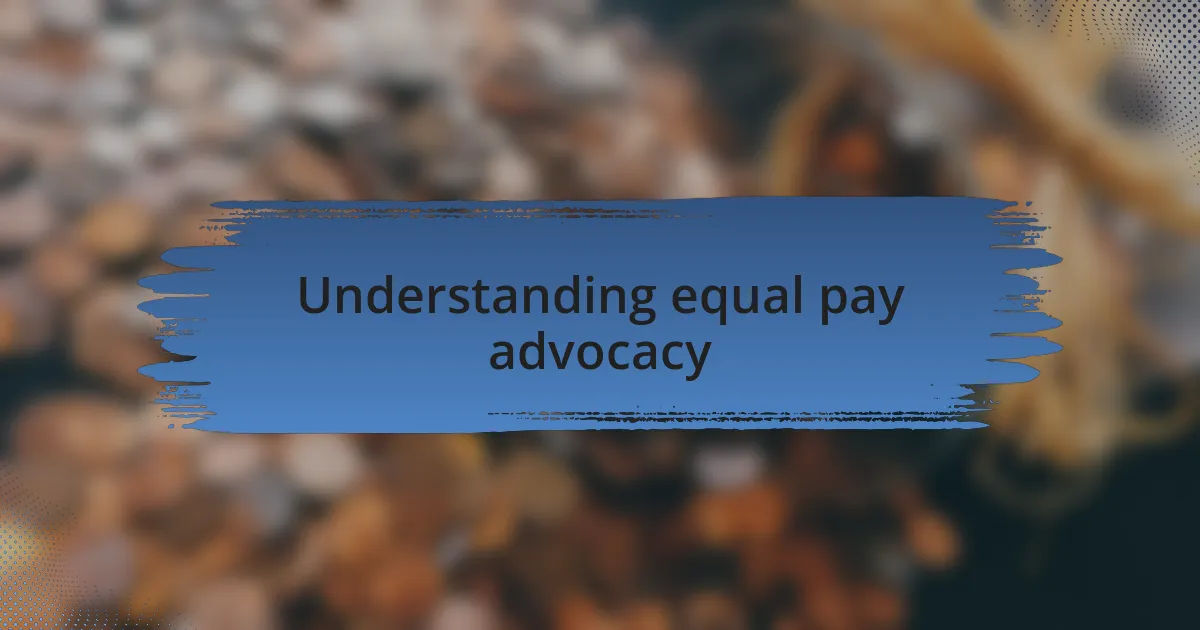Key takeaways:
- Equal pay advocacy focuses on ensuring fair compensation for the same work, encouraging open conversations about salary to foster transparency and empowerment.
- Effective salary negotiation involves preparation, understanding your worth, and timing discussions appropriately to reinforce your value.
- Researching salary benchmarks and networking can provide crucial insights that enhance negotiation positions and challenge wage inequities.
- Building confidence in negotiations requires recognizing personal achievements and embracing vulnerability while maintaining assertiveness to foster constructive dialogue.

Understanding equal pay advocacy
Equal pay advocacy is fundamentally about ensuring that individuals receive the same compensation for the same work, regardless of gender, race, or background. I often find myself reflecting on inequities I’ve observed in various workplaces. Can you imagine the frustration of working hard yet being paid less than a colleague for identical roles? It’s a stark injustice that many of us have faced or witnessed.
When I think about equal pay advocacy, I consider the stories shared by friends and colleagues who’ve bravely confronted these disparities. One friend recounted her experience negotiating her salary and discovering that a male counterpart was earning significantly more for identical tasks. Her candidness inspired me to dig deeper into this issue and realize the power of speaking up and advocating for oneself. This journey was not just professional; it also stoked a passion for fairness.
In my view, equal pay advocacy goes beyond just legal policies; it’s about creating a culture of transparency. How can organizations expect to foster loyalty and motivation among their staff if pay inequities linger in silence? I believe that open conversations around salaries can drive not only individual empowerment but also systemic change, encouraging others to fight for their worth.

Importance of salary negotiation
Negotiating salary is crucial because it defines our worth in the workplace. I vividly remember a time when I hesitated to ask for a raise because I feared rejection. After realizing that silence could lead to stagnation, I decided to advocate for myself and opened the conversation with my manager. The outcome was empowering—it not only increased my salary but also reinforced my confidence in my abilities.
Understanding the salary negotiation process isn’t just about the numbers; it’s an opportunity to articulate our value. Have you ever thought about how your contributions have driven success in your role? I’ve noticed that when I engage in these discussions, it becomes clear how my skills and dedication impact the team. This process not only sets the tone for future negotiations but also fosters a sense of self-worth that resonates beyond the paycheck.
Moreover, salary negotiation plays a vital role in addressing broader wage gaps within organizations. Each time we demand fair compensation, we chip away at ingrained inequalities. I can’t help but think about the potential change we can create together. When employees recognize their worth and speak up, it prompts companies to adopt fairer pay practices, paving the way for a more equitable work environment for everyone.

Researching salary benchmarks
Researching salary benchmarks is essential before entering any negotiation. I remember when I was preparing for a job interview and discovered that my role in the industry had a wide range of salaries. This knowledge empowered me; it was no longer just guesswork. I could back my salary expectations with data, giving me the confidence to initiate a meaningful conversation about the compensation I deserved.
It’s not just about knowing the average salary, though. It’s important to delve deeper into geographical differences and industry standards. For instance, I once found out that roles in tech pay significantly more in urban areas compared to rural settings. This insight allowed me to adjust my asking price appropriately, aligning it with my skill set and the market’s reality. Have you taken the time to explore websites like Glassdoor or PayScale? They can be invaluable resources for gathering this information.
Another powerful tool in salary research is networking with peers in your field. I’ve reached out to former colleagues for insights, and their perspectives have often revealed hidden salaries tied to specific job titles. It’s fascinating how conversations can illuminate not just numbers, but also the nuances of what various positions entail. Have you considered tapping into your network for this type of information? You might find that discussions lead to surprising revelations that can strengthen your negotiation position.

Strategies for effective negotiation
One effective strategy in salary negotiation is to practice your pitch beforehand. I vividly recall standing in front of my mirror, rehearsing my opening statement. It felt a bit silly at first, but when the actual conversation rolled around, I was surprised at how confident I felt. Have you ever tried role-playing with a friend or mentor? This exercise can sharpen your delivery and help you anticipate potential questions or objections.
Another critical aspect to consider is timing. I learned the hard way that bringing up salary too early can undermine the negotiation process. In one instance, I was so eager to discuss compensation that it overshadowed my accomplishments during an interview. Instead, I found that waiting until after expressing my value, achievements, and fit for the company made the conversation much smoother. Have you thought about when the best time might be to introduce your salary expectations?
Lastly, focusing on a collaborative mindset can transform negotiations from a battleground into a shared journey. When I shifted my perspective from “What can I get?” to “How can we make this work?” it changed everything. This approach not only fosters a more positive atmosphere but also opens the door to creative solutions that benefit both parties. What if you approached negotiations with an emphasis on mutual respect and understanding? You might find that it leads to a more fruitful outcome for everyone involved.

Building confidence in negotiations
Building confidence in negotiations involves more than just knowing your worth; it incorporates a mental shift that I’ve found to be crucial. I remember my first negotiation feeling like a rollercoaster of nerves, but then I embraced the mindset that I was not just asking for a salary, but presenting my skills as valuable assets to the company. Have you ever considered how your perspective can change the whole dynamic?
Preparation is key, and I often remind myself of a mentor who suggested creating a detailed list of my accomplishments. This exercise didn’t just clarify my value; it served as a tangible reminder during negotiations that I had put in the work and deserved consideration. When was the last time you reflected on your achievements? This practice helped solidify my confidence, turning what once felt like a daunting conversation into an exchange where I stood firmly on my ground.
Lastly, I believe that embracing vulnerability while maintaining confidence can create a powerful negotiation stance. There was a moment when I had to admit that I was uncertain about industry standards, but I paired this with an open acknowledgment of my unique qualifications. Did you know that showing authenticity can disarm opponents and build rapport? That acknowledgment not only strengthened my position but it also fostered a sense of trust, leading to a more constructive dialogue.

Personal success stories
When I think about my success in negotiating salary, one particular experience stands out. I remember negotiating for a promotion after taking on additional responsibilities that significantly impacted my team’s performance. I laid out my contributions during that discussion, and the moment I could see my manager’s appreciation in their expression was incredibly validating—it reinforced the belief that advocacy for oneself can truly yield results.
Another time, I felt nervous going into a negotiation, but I reminded myself of the value I had already delivered. As I shared specific examples of how I exceeded targets and contributed to a positive work environment, I could feel my confidence rising. It was almost like a switch flipped; I realized that this wasn’t just about my pay, but about advocating for the role I played in our success as a team—can you think of a time when you felt that kind of empowerment?
I also recall a negotiation where I unexpectedly learned the power of storytelling. I recounted a moment from a challenging project, highlighting not only my problem-solving skills but also my collaborative spirit. The feedback I received was overwhelmingly positive, drawing parallels between my story and the company’s values. Have you ever shared your story in a negotiation? That personal touch transformed a routine discussion into an unforgettable conversation that ultimately changed the course of my career.